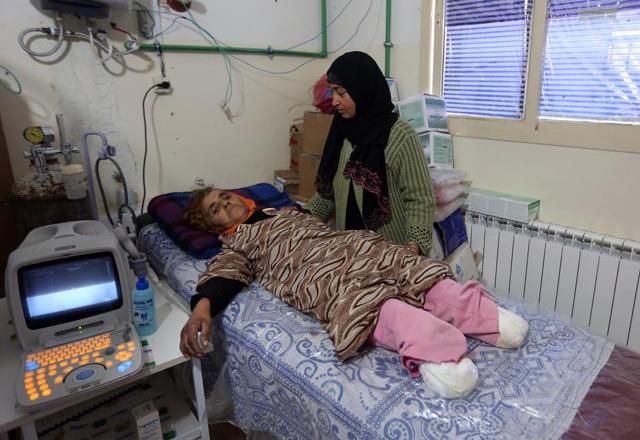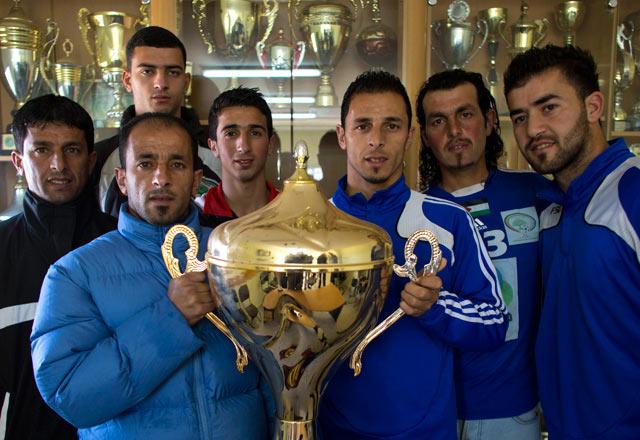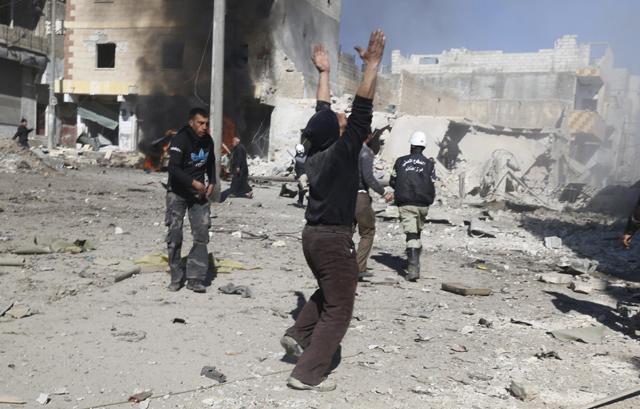BEIRUT — Government shelling and air strikes with makeshift barrel bombs have killed about 400 people in Syria’s largest city so far this month, activists said Thursday, as US and Russian envoys met in Geneva to try to revive deadlocked peace talks.
The bombings in Aleppo are part of a campaign by President Bashar Assad’s forces to wrest control of neighbourhoods that were seized by rebels in the northern city since mid-2012.
They come as a cease-fire in the central city of Homs has been extended for three days as of Thursday in order to allow more people to leave besieged rebel-held parts of the city, the Homs governor said.
Gov. Talal Barrazi said that as long as there are people who want to leave rebel-held areas in Homs the truce will be extended.
An official at Barrazi’s office said there were no evacuations from Homs on Thursday, adding that officials were working on clearing some 70 men of fighting age who left over the past days. Those already evacuated excluded men between the ages of 15 and 55 in case they were fighters. Despite that dozens crossed into government areas and passed after questioning.
The official, who spoke on condition of anonymity in line with regulations, said evacuations are expected to resume on Friday. It was the second extension since the truce went into effect last week.
Hundreds of civilians have been evacuated from Homs since Friday when a rare ceasefire went into effect. Aid workers took advantage of the temporary truce that was implemented by the warring sides before the second round of peace talks started in Geneva this week. The ceasefire expired on Wednesday night.
Khaled Erksoussi, the head of operations with the Syrian Arab Red Crescent told The Associated Press that since Friday, 1, 500 people have been evacuated from the besieged areas.
Before the aid effort began last Friday, the SARC estimated that up to 3,000 people were trapped in the rebel-held district that had been under government blockade for more than a year, causing hunger and widespread suffering of civilians in Syria’s third largest city.
Violence, meanwhile, continued in Aleppo.
The Britain-based Observatory for Human Rights said at least 51 people were killed Wednesday, mainly by barrel bombs, shrapnel-packed explosive devices dropped on eight rebel-held districts from helicopters. The observatory said that raised the total killed in the city to some 400 since the beginning of this month.
There is no way to independently verify the figure.
The observatory, which has been documenting Syria’s conflict since its start in March 2011 through a network of activists on the ground, released its report on the latest Aleppo casualties on Thursday, ahead of a trilateral meeting between senior US and Russian officials and UN mediator Lakhdar Brahimi, and Syrian government and opposition representatives in Geneva.
A second round of talks started in Switzerland on Monday but the discussions quickly became mired in acrimony as government and opposition delegates hurled accusations for the bloodshed taking place back home, failing to even agree on the talks’ agenda.
From the outset, the talks have been accompanied by a sharp rise in violence on the ground.
The observatory said that overall at least 4,959 people have died in Syria in the three-week period since January 22, when the government and opposition delegates sat down for the first round of face-to-face meetings in Geneva. The observatory said in a report Wednesday that the period has seen the highest death toll since the uprising against Assad started nearly three years ago.
More than 130,000 people have died in the conflict since then, activists say. Millions of Syrians have been driven from their homes, some seeking shelter in neighbouring countries and others in safe parts of their homeland.
Those include 400 families that have crossed into Lebanon since the Syrian army launched on offensive on rebel stronghold of Yabroud earlier this week, said Dana Sleiman, a spokeswoman for the UN refugee agency in Beirut.
Yabroud is the last rebel stronghold in Syria’s mountainous Qalamoun region, located about 16 kilometres from the Lebanese border. Backed by Lebanon’s Hizbollah fighters, the Syrian army has been on a crushing offensive there since early December.


















